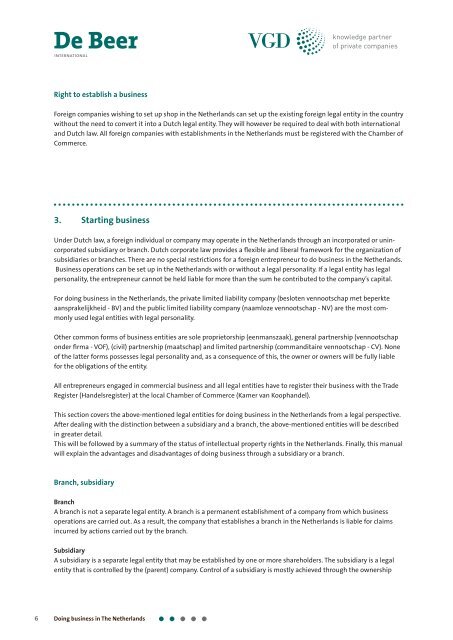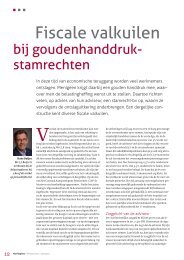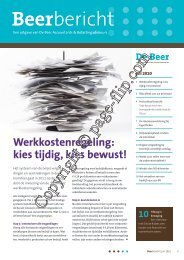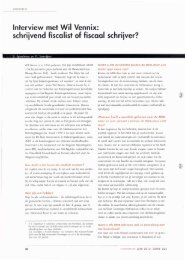De Beer
De Beer
De Beer
- No tags were found...
Create successful ePaper yourself
Turn your PDF publications into a flip-book with our unique Google optimized e-Paper software.
<strong>De</strong> <strong>Beer</strong>INTERNATIONALknowledge partnerof private companiesRight to establish a businessForeign companies wishing to set up shop in the Netherlands can set up the existing foreign legal entity in the countrywithout the need to convert it into a Dutch legal entity. They will however be required to deal with both internationaland Dutch law. All foreign companies with establishments in the Netherlands must be registered with the Chamber ofCommerce.3. Starting businessUnder Dutch law, a foreign individual or company may operate in the Netherlands through an incorporated or unincorporatedsubsidiary or branch. Dutch corporate law provides a flexible and liberal framework for the organization ofsubsidiaries or branches. There are no special restrictions for a foreign entrepreneur to do business in the Netherlands.Business operations can be set up in the Netherlands with or without a legal personality. If a legal entity has legalpersonality, the entrepreneur cannot be held liable for more than the sum he contributed to the company’s capital.For doing business in the Netherlands, the private limited liability company (besloten vennootschap met beperkteaansprakelijkheid - BV) and the public limited liability company (naamloze vennootschap - NV) are the most commonlyused legal entities with legal personality.Other common forms of business entities are sole proprietorship (eenmanszaak), general partnership (vennootschaponder firma - VOF), (civil) partnership (maatschap) and limited partnership (commanditaire vennootschap - CV). Noneof the latter forms possesses legal personality and, as a consequence of this, the owner or owners will be fully liablefor the obligations of the entity.All entrepreneurs engaged in commercial business and all legal entities have to register their business with the TradeRegister (Handelsregister) at the local Chamber of Commerce (Kamer van Koophandel).This section covers the above-mentioned legal entities for doing business in the Netherlands from a legal perspective.After dealing with the distinction between a subsidiary and a branch, the above-mentioned entities will be describedin greater detail.This will be followed by a summary of the status of intellectual property rights in the Netherlands. Finally, this manualwill explain the advantages and disadvantages of doing business through a subsidiary or a branch.Branch, subsidiaryBranchA branch is not a separate legal entity. A branch is a permanent establishment of a company from which businessoperations are carried out. As a result, the company that establishes a branch in the Netherlands is liable for claimsincurred by actions carried out by the branch.SubsidiaryA subsidiary is a separate legal entity that may be established by one or more shareholders. The subsidiary is a legalentity that is controlled by the (parent) company. Control of a subsidiary is mostly achieved through the ownership6 Doing business in The Netherlands







